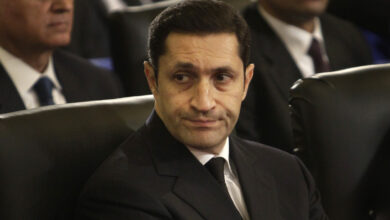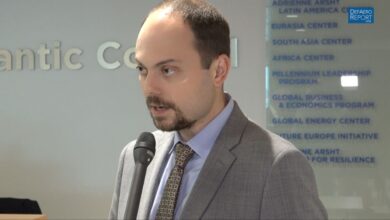At a conference organized by Amnesty International, families of those killed in the January 25 revolution accused Egypt's attorney general of unexplained dawdling in bringing to trial the policemen who carried out the killings.
The London-based human rights watchdog released a 100-page report on Thursday, documenting the security crackdown on protesters during the 18-day uprising in seven governorates. The report details killings, detentions and torture.
It renewed the frustration of victims’ families: four months have passed since the ouster of president Hosni Mubarak and their loved ones' killers are still on the loose.
“We need to have another revolution,” said Faisal Aly, whose 23-year-old son was shot in the head by a police officer on 29 January. “We are approaching four months and the officers who killed our sons are enjoying their lives in their homes, and were not even sacked from their jobs.”
Aly, like many other relatives of the victims, said he has received offers of thousands of pounds from the accused police officers to withdraw the lawsuits.
The report, entitled “Egypt rises: Killings, detentions and torture in the 25 January Revolution" condemned the unnecessary use of excessive force by security forces, which killed about 846 and injured 6000 peaceful protesters. It said there is still a lot to be done to achieve justice for the victims.
"Many hundreds of people who suffered grievous abuses during this period are still waiting to receive justice for what happened to them," the report stated.
Manal al-Batran said that the prosecution is reluctant to investigate the murder of her brother Mohamed al-Batran, a senior security officer at the Prison Section Department.
“The attorney general is mulling over the investigation because it will reveal evidence that would imprison Mubarak,” said Batran.
She added that her brother was assassinated after he defied orders to release prisoners, an attempt by the government to cause chaos and quell the mass protests.
“I provided the prosecution with all the necessary evidence and testimonies by eyewitnesses but they did not even examine the crime scene,” said Batran. “A revolution did not occur, and we are living in even darker days than the days under Mubarak’s rule.”
Atef Ahmed, who was severely injured during protests in the Beni Suef governorate, shared the same grievances.
“The attorney general tells us that they can’t find the policemen accused of firing at us,” said Ahmed, who has hemiplegia (total paralysis of one side of the body) because of a bullet to the head. “I feel that both the police and the army are conspiring and there are still people from the former regime working to kill the revolution.”
Martyrs’ relatives feel there is a double standard in the legal process when it comes to trying security officials.
“Today if they caught someone stealing a piece of bread, they will hang him, although they released the policemen who killed our sons,” said Saleh Mohamed, whose 15-year-old son was shot dead when he was heading home on 29 January.
Mohamed said his son pointed at the policeman who killed him while lying in his own blood, breathing his last breaths.
“I know who killed my son and if justice is not served, no one can blame me if I kill him myself,” Mohamed said.
The government said that relatives of those killed during protests would be awarded a monthly pension of LE1,500, or a one-off payment of LE50,000 if the victim had no dependents. But some victims’ families have not yet received any money.
Intesar Abdel Nabi, whose brother was killed during the uprising in the coastal city of Port Said, said that the prosecution has failed to release the document that proves her brother was a victim of the revolution, which would enable his family to receive a monthly pension.
Her brother was the main source of income for his wife and three children, who are now living in a slum area in harsh living conditions.
“Is it justice when a mother and her little kids spend four months without food and water?” asked Abdel-Nabi.
The Amnesty International report was published just two days before former interior minister Habib al-Adly goes on trial on charges connected with the killings of protesters.




